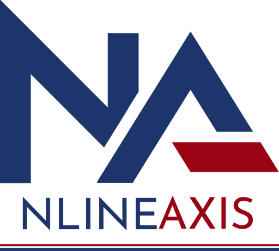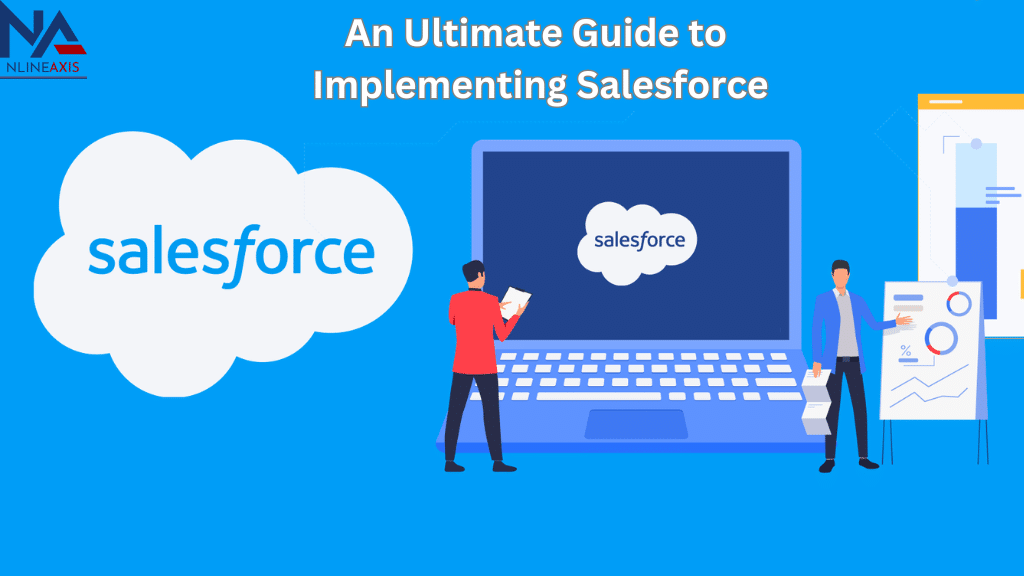An Ultimate Guide to Implementing Salesforce
Transitioning a business to a CRM system is a complex and challenging task, needing considerable time and resources, and including several considerations. However, the rewards can be significant once the system is completely implemented.
Selecting the right Salesforce managed service provider is of paramount importance. Opting for a certified partner such as NLINEAXIS IT Solutions Private Limited guarantees comprehensive support throughout the complete procedure, from early consultation to integration and continuing assistance. A wealth of experience is important, mainly in parts such as product development, business process consulting, and several stages of customization and integration.
To ensure your business is well-prepared and positioned to maximize the benefits of a new CRM program, there are numerous steps and tips worth considering, with a special emphasis on best practices and the role of Salesforce consulting companies in providing Salesforce development services.
Why Implementing Salesforce is Essential
The basis for incorporating a Customer Relationship Management (CRM) system is clear-cut. Every organisation aspires to establish stronger connections with its customers, cultivating loyalty and a positive brand reputation by proactively fulfilling their demands.
Efficiency improvements, cost reduction, and the expansion of assets and skills are common business objectives. Salesforce plays a crucial role in accomplishing these goals.
A successful Salesforce implementation guide offers important rewards to your business. It delivers a comprehensive understanding of your customers, supplying timely, actionable insights in a user-friendly format. This allows you to make data-informed decisions when necessary.
Salesforce equips you with the tools to enhance your processes through technologies such as artificial intelligence and automation, allowing you to achieve more in significantly less time and with minimal effort. Additionally, it fosters seamless, straightforward, and more efficient collaboration among your teams.
The challenge lies in executing a Salesforce implementation guide that efficiently adapts to the platform’s strong features into practical solutions for your precise business requirements. The crucial aspect is ensuring the accurate execution of the implementation strategy.
NLINEAXIS IT Solutions Private Limited is your premier choice when it comes to finding a reliable and experienced Salesforce consulting company that excels in delivering top-notch Salesforce development services. As highlighted in the comprehensive guide above, the implementation of Salesforce is a critical endeavor for businesses seeking to harness the full potential of this powerful CRM platform. With a proven track record and a team of experts deeply versed in the intricacies of Salesforce, NLINEAXIS offers tailored solutions that align with your unique objectives and business processes.
Effective Salesforce Implementation Planning
The procedure of implementing Salesforce will mainly be shaped by the specific features of your business. Variations in business’s culture, operational structures, and unique requirements will be evident across different organisations. However, by systematic preparation and adherence to the best practices for Salesforce implementation, you significantly improve your organisation’s potential to completely capitalize on the platform’s advantages. Moreover, it’s frequently recommended to engage a Salesforce consulting company to provide proficiency and guidance throughout the process.
Let’s explore important basics that should undeniably be included into your planning process to guarantee comprehensive preparation.
Defining KPIs, Goals, and Business Objectives
The success of your Salesforce implementation is heavily contingent on its alignment with your business’s main goals. Therefore, it’s critical to establish these goals right from the beginning. What definite challenges do you looking to address? What accomplishments are you determined for?
One effective tactic is to work backward. Begin by recognizing the expected results. For instance, consider the sorts of reports you wish to produce, the insights you plan to leverage, and the processes you need your Salesforce implementation to support.
Systematically thinking through and documenting your goals, key performance indicators (KPIs), and organisation’s purposes offers precision throughout the implementation process. It contributes in setting priorities and maintains focus as you continue with the implementation. Furthermore, it improves your implementation partner’s understanding of your requirements and allows them to establish and achieve expectations effectively.
Also Read: Send Email In HTML Table Format via App Script App
Define Stakeholders
The success of your implementation essentially revolves around people. They are the driving force behind the developments. As early as possible in the process, it’s central to recognize the key stakeholders in your Salesforce implementation and involve them.
These stakeholders encompass both internal and external entities, some of whom may not be direct users of the program. Depending on your business, you might, for example, have regulators who may not log into the internal systems but still need your CRM to enable compliance.
Consider partners such as suppliers and distributors whose systems you may wish to integrate with your new setup. And, certainly, there are your internal users—various departments with distinct concerns, all dependent on cross-team data to function optimally.
Collecting and Structuring Existing Data
To achieve optimal results, you must supply your CRM with high-quality data. Dedicate ample time to evaluate your current data and confirm its readiness for your CRM implementation. While this process can be time-intensive and thorough, it will yield significant benefits and ultimately save you valuable time, expenses, and resources.
Observe your data sources and determine where your data is stored. Identify which data remains related, pinpoint potential duplications across several systems (such as contacts and email addresses), and recognize any conflicts.
Clean, high-quality, and uniform data is crucial to ensure the suitable functioning of automations, seamless cross-platform integrations, and the optimal health of your databases.
Determine Necessary Reports
Considering the sorts of reports, you wish to produce from your Salesforce system serves as valuable guidance for the implementation procedure and helps explain any potential constraints before initiation. By approaching this job with the needs of your stakeholders in mind, you can more efficiently determine how the system can supply to specific requirements.
For example, your marketing team may pursue a unified process for tracking leads across email, social media, mobile, and the web. Sales representatives might require quick access to customer information from several platforms to get ahead their requirements and facilitate cross-selling or upselling. You may also intend to improve the coordination of your order, payment, invoicing, and supply chain systems.
Comprehend the Expenses
Once you have a more wide-ranging understanding of what you anticipate Salesforce to deliver for your business, it becomes simpler to evaluate the cost of implementing Salesforce. At its core, this cost is characteristically influenced by the size of the business.
In addition to this, you will want to reflect on the expenses related to the modules you choose to include. These costs frequently appear because of custom necessities and the need for additional features.
Furthermore, it’s crucial to keep in mind that beyond the initial implementation cost, there are continuing expenses for maintaining and operating the solution. Once again, all of this is contingent on the size of the business and the precise configuration.
For planning purposes, it’s recommended to budget approximately one-third of your licensing cost for the implementation and an additional 25 percent for ongoing maintenance.
Must Check: What Is The Role And Responsibilities Of Salesforce CRM Consultant?
Salesforce Implementation Steps
The process of establishing Salesforce typically unfolds through an order of stages and is rarely a single, isolated occurrence. Even with module-based implementation, the following recommendations will be valuable at each phase.
Develop a CRM Data Model
The data model serves as the abstract depiction of how data will circulate across your system. It outlines the configuration of data, including the reasonable entities and their interconnections, and how this affects your organisation’s processes.
Within the data model, you incorporate several data components, such as objects, records, and fields, which play a role in supporting your organisation through the CRM system. These mechanisms signify entities such as contacts, products, users, accounts, cases, and more.
Create a CRM Prototype
Reflect on the Prototype as a primary blueprint of the CRM system. It strengthens concepts and offers a model of the recommended solution for assessment and adjustment by decision-makers as required.
Fundamentally, it’s a design presentation, offering a visualization of the steps establishing your organisation’s processes and indicating how Salesforce will help them in your implementation.
This method also assures that you are capturing all the appropriate data for your CRM before commencing the actual setup course.
Importing Your Data
During the preparatory phases, you should have preferably refined your data, positioning your fields, objects, and records with the Salesforce structure. At this point, the remaining job is to go ahead with data import. It may still be essential to establish custom fields for tracking information not presently put up by Salesforce.
Integrate with Additional Tools
It’s probable that you’ll require your CRM system to connect with other cloud platforms, SaaS applications, ERP solutions, or local software. Your selected Salesforce implementation partner is the most suitable entity to support with the seamless integration of your systems.
A seasoned partner will help you in configuring intricate API integrations, creating a unified cross-platform authentication system, and easing the incorporation of legacy systems into your new solution.
Customize the CRM Solution
To successfully suit your unique organisation’s processes, you’ll require to customize your CRM. It’s not likely to be a ready-made solution. During this phase, you personalize your platform by introducing custom fields, organizing layouts to match your preferences, and addressing other tailored requirements.
Evaluate Your Salesforce CRM
Once your CRM is up and running, it’s time to evaluate whether the primary setup aligns with your functional needs. Typically, this assessment is led by a quality assurance team responsible for confirming that the integrations are functioning properly and that the system successfully supports all your anticipated business processes.
Gather Input from End Users and Implement Essential Modifications
The early phases of your new CRM program offer a chance to gather feedback and fine-tune the new platform to confirm it functions flawlessly and that your staff can use it with ease. It’s significant to actively pursue and compile as much feedback as possible and provide training to your staff on the best practices for best platform usage.
Official Launch
Once the pilot program is finished, you can formally roll out the Salesforce solution to your customers. You also have the choice to launch silently and evaulate the adoption rate, making modifications as needed.
NLINEAXIS understands that the role of a Salesforce consulting company goes far beyond the initial setup of the platform. It involves providing expertise and support throughout your Salesforce journey. When it comes to Salesforce development services, NLINEAXIS excels in delivering customized solutions and applications that extend the functionality of your CRM platform. As a Salesforce consulting company, we prioritize open and clear communication. We work closely with your team, making sure that your business objectives and processes are understood and incorporated into the Salesforce setup. Whether you are looking to initiate your Salesforce implementation, need specialized Salesforce development services, or require ongoing support, NLINEAXIS has the expertise, experience, and dedication to ensure your success.


